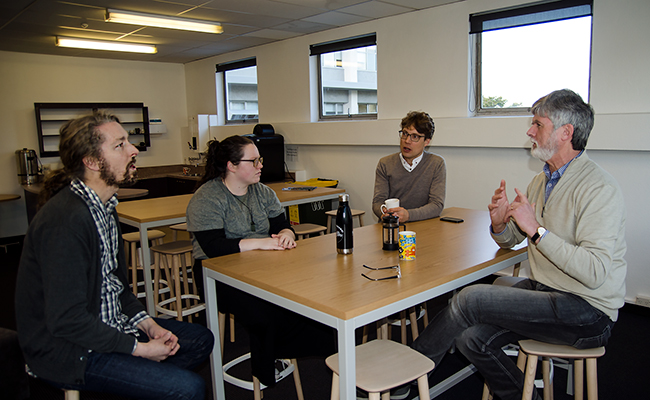Wednesday 14 August 2019 12:33pm

(From left) Subject Librarian Alexander Ritchie, Humanities Kaiawhina Māori - Māori Student Support Officer Ella Walsh, Professor Jacob Edmond (English) and Professor Greg Dawes (Philosophy and Religion) at this week's Café Reo.
What would a ‘Radical Philosophy’ paper be called in Māori? This is just one of the topics explored at the new Café Reo chat sessions.
Organisers Professor Greg Dawes (Philosophy and Religion) and Professor Jacob Edmond (English) say the informal Café Reo events will be held at 10.00am on Wednesday each week in the Arts Building’s Common Room.
Greg says the aim is to provide an opportunity to develop te reo skills in an informal setting.
“Jacob and I are both doing a Māori language evening course with Te Wānanga o Aotearoa and it’s great, but it’s difficult to find opportunities to speak the language, or to try to speak the language, between classes.
“I kept hearing of other people in the University who are learning Māori and thought it would be helpful to have a place where we could practise our conversation.”
Greg’s experience learning Latin and Italian has shown the only way to make progress is to “go all in”, and practise with those more and less conversant as frequently as possible.
“Although it can be a scary experience when those around you are more fluent, it’s wonderful when you can communicate.
“During our first Café Reo, Jacob and I managed to discuss all kinds of topics, including the existence of different styles of philosophy and why some philosophers don’t like Derrida. We had to stop to look up words occasionally or to try to decide what something should be called. We decided, for instance, that the “Radical Philosophy” paper should be called Te Whakaaroaro Kaiwhakatuma, a name that I now really like.”
He was prompted start learning te reo while reading New Zealand histories, including the recent Tangata Whenua, by Atholl Anderson, Judith Binney and Aroha Harris, and some of the historically significant works by authors such as Elsdon Best and Otago alumnus Te Rangi Hiroa (Sir Peter Buck).
“What has fascinated me is seeing how Māori culture has adapted to the changing world — te ao hurihuri — while maintaining so many of its best features. But I found I could go only so far. You can’t really understand a culture without knowing its language.
“As is often the case, there’s a whakataukī that sums this all up: He aha te kai a te rangatira? He kōrero, he kōrero, he kōrero.”
